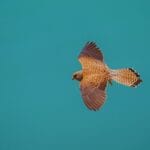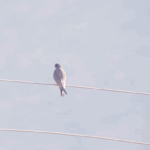The tagged specimen of Griffon vulture (Gyps fulvus) with a satellite transmitter, named as Mokoš, was recaptured by the AOS field-ornithologists in Shkrodra region after we got notified by our regional partners, BirdLife Montenegro (CZIP) and BirdLife Slovenia (DOPPS), for the geographical data of the place where the specimen was located.
Mokoš was found to have suffered great weight loss, exhaustion, and in addition, non-capable to continue its flight towards the respective destination. Therefore, the AOS field-ornithologists according to the instructions that were provided by the experts of the Beli Visitor Center, immediately sent the specimen of Griffon vulture at the Center for the Rehabilitation of Wild Bird, located in Divjaka-Karavasta National Park.
Since the 1st day of arrival in the Rehabilitation Center, Mokoš has been under the treatment and continuous supervision according to the clinical scheme counseled and provided by the international experts in such clinical cases. Mokoš is treated with a diet with richness nutrients to guarantee the gain of weight, serum (mineral salts), external anti-parasitic medication, and one-week treatment with antibiotics.
How the recovery process of Mokoš is going?
Recently, after 10 days of consecutive and daily-basis treatment, Mokoš is manifesting positive signs and indicators regarding its clinical conditions. The latest medical check-up conducted, indicated that Mokoš has gained + 0.6 kg compared with his body weight in the moment of recapture when he weighed just 4.8 kg. According to international experts, such a weight is below the critical minimum. The increase in body weight is really good news as it is the best indicator of the vulture recovery.
Besides, the journey that Mokoš has gone through it’s not that easy – during the latest weeks, Mokoš’ claws were appeared twisted, where the experts of Beli Visitor Center suspected that Mokoš could have been poisoned by heavy metals (lead, zinc) or by veterinary medicinal products probably taken when feeding. In collaboration with the vet team of the Royal Albania Foundation in order to verify if the specimen of Griffon vulture has been encountered with poisonous substances, we collected and analyzed the blood samples of Mokoš. Fortunately, the results were negative avoiding thus the risk of poisoning.
We here at the Albanian Ornithological Society (AOS) would like to thank all the contributors who are showing an incomparable dedication to the rehabilitation of Mokoš. Meanwhile, the AOS in close cooperation with the other contributors remains committed to improving the clinical state of Mokoš and we hope that will be able to return in the wild, and we believe that if the progress will carry on with that rhythm, this will not be far off.
Keep an eye out in the AOS communication channels to learn more about Mokoš’ progress in the following days!
[/et_pb_text][/et_pb_column][/et_pb_row][et_pb_row _builder_version=”3.26.3″ custom_margin=”|auto|32px|auto||”][et_pb_column _builder_version=”3.26.3″ type=”4_4″][et_pb_gallery _builder_version=”3.26.3″ gallery_ids=”5556,5553,5551,5552″ show_title_and_caption=”off”][/et_pb_gallery][/et_pb_column][/et_pb_row][/et_pb_section]





